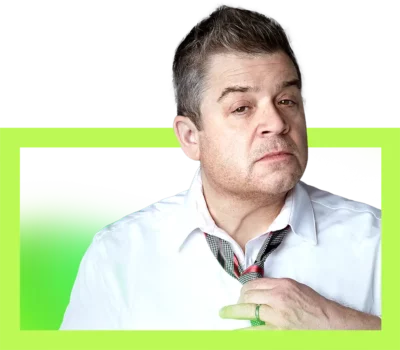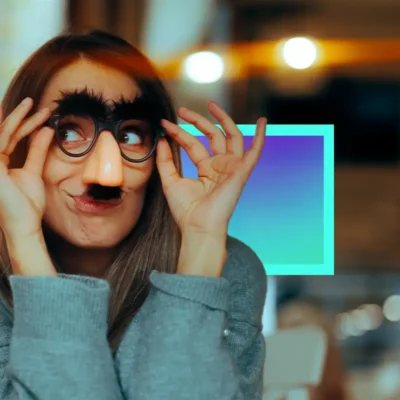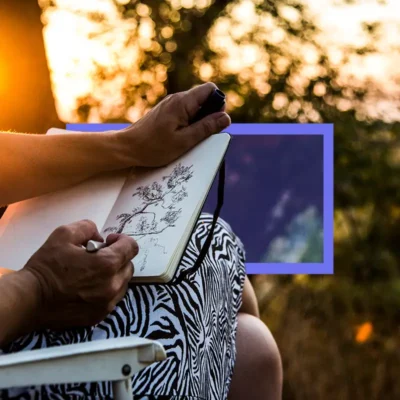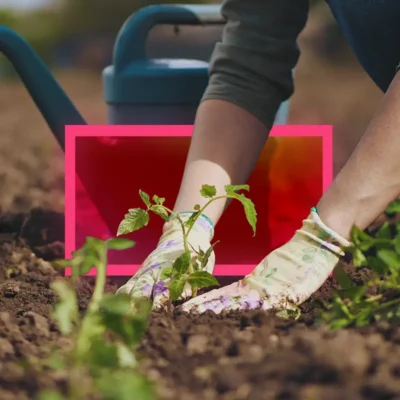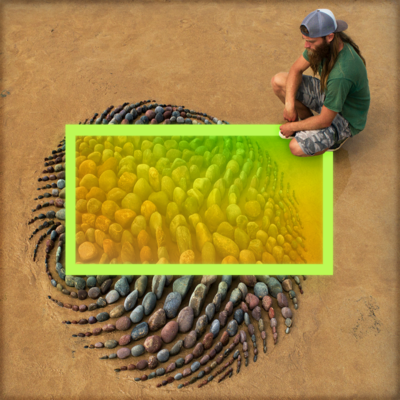It’s chaos, be kind
When life hands you an unimaginable sorrow, how do you begin to recover your joy, your connection, your creative spark? In a special crossover episode with our friends at the Spark & Fire podcast, comedian and actor Patton Oswalt (you might know him as the voice of Remy in “Ratatouille”) shares a powerful story about how he slowly reclaimed his creative spirit after a tragedy that left him questioning everything. It’s a story of family, community, and connectedness, co-hosted by Rohan and Spark & Fire host June Cohen.
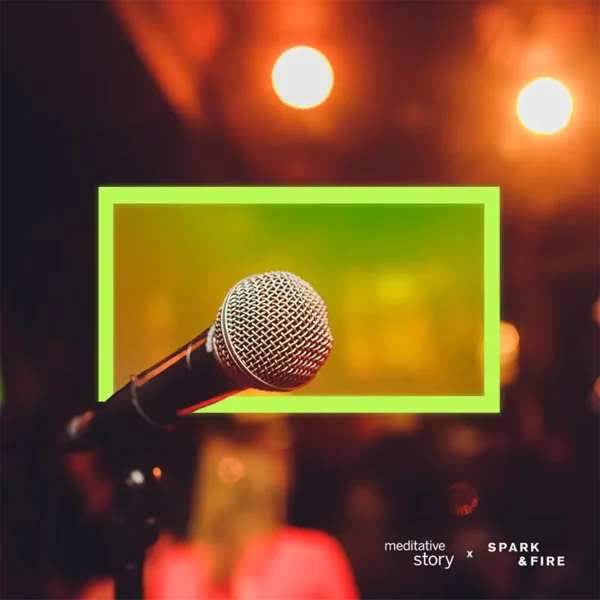
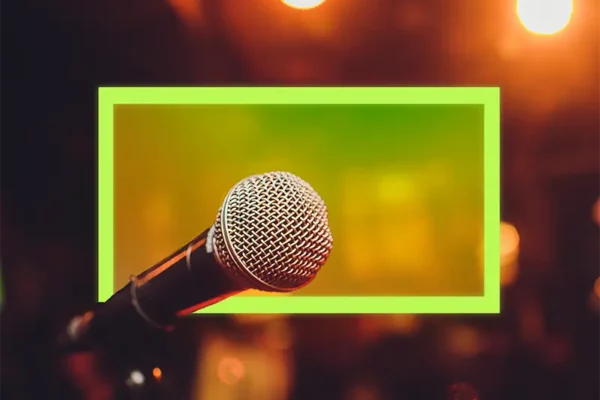
Transcript:
It’s chaos, be kind
ROHAN GUNATILLAKE: Hi listeners.
We’re doing something a little different today that I think you’ll really enjoy.
Our sister podcast, Spark & Fire, is launching their second season in partnership with the BBC, and we’ve teamed up to share a portion of one of their fantastic new episodes with you.
Spark and Fire is a show about the creative process in which legendary creators describe the steps they took to produce an iconic work.
The show features amazing guests ranging from cellist Yo-Yo Ma, writer/director Kemp Powers, and actor Randall Park.
I love how many cross-connections there are between creativity and mindfulness. The methods that the storytellers on Spark and Fire share to unlock and maintain their creativity are many of the same essential elements we explore in meditation practice: looking within, healing, finding flow, curiosity, community.
That’s especially true in this episode featuring comedian Patton Oswalt. He tells the story of making two of his comedy specials, the first of which is called Annihilation, and he created it in the aftermath of the sudden death of his wife.
His story opens up the idea that grief can give way to creativity — and that creativity can catalyze a path through grief.
In a moment, I’m going to pass it over to June Cohen and Patton Oswalt.
As you listen to Patton, notice the reactions that arise in body and mind. As always, we listen relaxed, we listen breathing, we listen open.
[THEME MUSIC]
JUNE COHEN: Every creative work you’ve ever loved has a hero’s journey behind it. Whether it’s a book or a building. A film or a photograph. On this show, creators from different fields share their stories – to fuel your creativity. From WaitWhat and the BBC, this is Spark and Fire. I’m your host, June Cohen, and I’m here to spark your creative journey.
Chapter 1: Something I didn’t know.
PATTON OSWALT: Annihilation is almost like a … I don’t want to get all pretentious about this, but it’s a nice little document that shows that I can adapt to, and adjust to, and survive more than I thought that I could, because there were weeks and months after Michelle passed where I would’ve been very happy to have been annihilated, and not exist anymore. It wasn’t even a desire for death. It was absolute indifference to whether or not I lived or died. It’s really scary to have to face that. So, being able to make jokes about that was a … I don’t know. It really felt like, “Oh, you found out something about yourself that you didn’t know.”
Chapter 2: Shipwreck.
OSWALT: April 21st, 2016. That’s the day my wife passed away. I had a new special coming out on Netflix the day before the tour that I was about to go on. The tour, everything had to be shut down because I was just in complete shipwreck and worrying about my daughter and worrying about her family. And I was trying to deflect all the terror that I was feeling.
I had these really surreal days where I was wondering, “Am I the one who died? Am I dead right now, and I can’t deal with the horror of myself dying, so I’ve created this scenario where it’s Michelle that’s dead, and I’m protecting our daughter?” I mean, I literally had these real psychotic episodes. I thought I had actually gotten to a higher level because I wasn’t experiencing sadness. I also wasn’t experiencing anger or joy or fear. I wasn’t experiencing.
I said, “I’m just going to merely exist. I am going to wake up every morning, give my daughter breakfast, take her to school, park outside her school, wait until school is over, pick her up, bring her home, help her with her homework, make her dinner, go to bed.” That’s all I was doing.
I was like, “I’m done being a comedian. I’m never going to be a comedian again.”
Chapter 3: Exactly what I needed to hear.
OSWALT: At that point, I’d been doing stand-up for almost 30 years. It was all I knew how to do. It’s been my main life force.
And if I can’t do the thing that brings me the most joy in life, then what kind of father am I going to be to Alice? What kind of friend will I be to my friends? What kind of brother will I be to my brother? I wanted to be able to function and live my best life for the people around me in the world. What do I matter in the world if this doesn’t work for me anymore?
A friend of mine, Michael Penn, gave me C.S. Lewis’s A Grief Observed. And I was going to a grief group and talking to other widows.
Then a friend of mine’s husband passed away, and another friend of mine’s sister passed away. And I went into this dumb, egotistical self spiral of: Have I become this avatar of death? Do I bring death to everyone I know?
I was shooting a TV series called Those Who Can’t. And the scene was with Susie Essman from Curb Your Enthusiasm. And I was telling her how I was feeling, and she just listened. And then she just went, “You’re not that important, honey.” And it was so funny, but it was, also, so exactly what I needed to hear. It kicked me out of it. It’s like, “Oh wait a minute. Yeah, that’s right, life is so much more gigantic.” It was so freeing. And it also brought me back to what my wife always said, my late wife always said, which is: “It’s chaos, be kind.”
She hated the phrase, “You know, things happen for a reason.” She’s like, “No, they don’t. No, they don’t.” It’s all random. We have no control over it. There’s no bigger latticework to it. And the only sanity and order you can bring to life is by being nice to people. And that’s it. That’s the only power we have. This is getting into Oprah territory, but it felt like it was Michelle speaking to me through Susie at that moment, just going, “Hey. You make people laugh, all right. That’s fine. You’re, you’re doing your part. You don’t have the elixir to heal the world. That’s actually pretty good. Go tell jokes.”
Chapter 4: How I got back on stage.
How do you find hope if the pain won’t let you start? Find someone who’s a good hang.
OSWALT: It was literally not a spark of inspiration or creativity that led me to it. It was just trying to push against this death vibe that I was living with.
I remember reading Stephen King’s On Writing after he had that horrific accident. He couldn’t write for a while, and writing was something he did every day of his life. And the first couple times writing wasn’t about what he was writing. It was about, “Can I sit here again at the keyboard and hit the keyboard and make words come out?” I even think he says, “I can’t even remember what I wrote or what I was writing.” It was like, “Can I just sit here and write again? Despite all the pain and all the disruption and the upheaval that I’ve gone through, can I still do this?”
There wasn’t some inspirational moment. And it had nothing to do with me doing material. I just wanted to go on stage and see if I could talk and exist. Like, “Can I get out of my house and go on stage?” It was that crucial, and it was also that simple. It was that crucial, and it was that simple.
The first show I did that night was at the UCB Theatre. I feel like I want to say that I was nervous, but it would not surprise me if what actually happened was I didn’t feel a single thing. It was that automatic: I just want to go on stage and try to just get through this. It was really, really rough. I just cannot remember what I talked about. God, I couldn’t even tell you. God damn. I just went up and tried my best.
I remember a comedian named Emily Heller was on the show. She’s this young comedian coming up at the time. Oh my God, she was so hilarious. And then from there going to the Palace, which is this Chinese restaurant, and upstairs, there was like a room that they would do stand-up in, and I saw Emily Heller at that show too. She was doing different stuff than she had done earlier that evening. I was like, “Oh, that’s what it’s like when you’re in that mode, when you’re a young comedian, and you just find your voice. The jokes are just flowing and you just want to get on as many stages…” And I told her, I was like, “My God! The stuff you did earlier, you had all new stuff right now. That’s got to feel so great.” Like, this is awesome, comedy’s not dead.
Then I started going up a little more and a little more. What got me back on the road to being a human was not me doing sets. It was the hang. Hanging out with other comedians and watching them work on stuff and be creative and come up with angles on things that you hadn’t thought of gets you fired up and gets you happy again. Getting to have that back in my life made me hopeful again. It made me hopeful.
GUNATILLAKE: There’s such an important insight here: Community really matters. It’s what turned the corner for Patton. First it’s his friends nudging him with an offered book, then a wise telling off flips him into a bigger perspective. Then the community of his fellow performers inspires him and reminds him of what brings him to life. The mind-states and behaviors of those around us affect our own. So if we can, we choose well, choose the people we spend time with. Let’s be grateful for the people in our lives who do energize us — thank you — and make the intention to seek out people who express the qualities we want to grow in.
Chapter 5: Relearning the craft.
How do you find humor when you’re deep in grief? Look for the absurdity.
OSWALT: I was getting my comedy legs back. Stuff that I used to be able to recognize immediately as being great comedy fodder, because it was still so tied up with my grief and my pain, took me a few more days.
It’s hard for me to sit and write the comedy out before I do it. I jot down ideas, stuff that I want to talk about and explore, because a lot of times, ideas will come to me while I’m zipping around, I’m traveling, I’m acting in something, I’m running errands, doing daddy-daughter stuff. So you’ve got to be able to be very open about, “Can I get a pen and a piece of paper? Anyone have anything?” or just “Give me a second,” and then text something to yourself. Don’t be embarrassed about that. Grab it.
My wife died on a Thursday. I had to tell Alice on a Friday. One of the first things she said once she had stopped crying for a second was, “I want to go to school on Monday.” In other words, even if it’s fake, I want to bring some kind of normalcy to my life. I had to take her to school on Monday, and that was after a weekend of not sleeping and freaking out at the kids asking me questions. It took me a couple days after that, that I realized how absurd that was.
Me, having to become more and more aware of what was happening around me that was absurd, and then I found a way to start talking about my grief that was funny in a way that could connect with people. And also connect with the bigger, the cosmic. Turn the mundane into the cosmic.
I had done this whole trip to Chicago to Christmas to see all of her cousins. We had blocked out all the horribleness, and I’ve given her nothing but fun and adventure and tried to keep it upbeat. Then getting to the airport, and we’re about to make a clean getaway and get back to LA, and then this woman waylays us and tells us about the horrors of losing a parent. “Oh, when I was young, my mother died. My father never got over it.” I remember at the gate, I was horrified, and then we got on the plane. We’re crying. Then it took a couple days to go, “Wait a second. That was nuts.”
Chapter 6: Taping the comedy special, Annihilation.
OSWALT: I had been doing shows leading up to it everywhere that I could. Show, show, show, show, show. It was so much automatic-pilot and subconscious old reflexes coming back that I wasn’t aware of because I was too aware of still trying to survive every day.
When the hour began to gel, I had this whole other level of anxiety of, “Should I even be doing this?” It felt like I was so trivializing it and making it petty by doing it as an hour of jokes.
There were a couple of times preparing for that show where I toyed with the idea where I did an hour where I never talked about my wife dying, or the fact that I had become a widower or any of that stuff, and never acknowledging that. I did it in a couple of shows that I was doing down at Irvine, and that was even weirder for the audience. It was like, “We all know what happened to you.” That option was gone. I knew that option was gone, and I had to talk about it somehow.
The day before was torture. June 1st, when I get to Chicago, I was so tense. Despite the fact that the set had been doing well on the road, there was a thing in the back of my mind of, I was going to get out there, and because of what I was talking about, it was just going to get nothing, get no laughs. “Okay. We got to work out the camera angles and the sound check,” and all this. I was just like, “Just let me get on stage and start. If I can just start, all this anxiety will go away, but can you just let me start?”
Friday the 2nd of June. I’m just standing offstage with my head pointed at the ground, just trying to block out what’s happening. I don’t want to think about anything else. Have the person say my name and let me go out.
The first five minutes was terror. Just me doing jokes about life and blah, blah, blah, and talking to the audience and fun, fun, fun. I’m like, “Oh, this is going to be a huge mistake. Any second, the whole audience and me are going to go, ‘No. No, this is a bad idea. No, no, no, no, no.’” The whole thing’s going to shut down. But luckily that didn’t happen.
It wasn’t until I got to pushing through, talking about my wife passing away and then doing the bit about the Polish woman at the airport. “Oh, when I was young, my mother died. My father never got over it.”
Once I was able to acknowledge what was happening, I felt like, oh, okay.
GUNATILLAKE: We’ll end at this point today, but if you want to hear how Patton moves through his journey with grief and progresses through his creative process, you can listen to the rest of his story on the Spark and Fire Podcast.
Thank you Patton, and also thank you to the team at Spark & Fire. So many lines from Patton’s story struck me, one of which is his technique of processing and communicating his grief by turning the mundane into the cosmic.
Subscribe to Spark and Fire in your podcast player or listen to episodes on their website. Their entire new season is going to be incredible. You won’t want to miss it.

